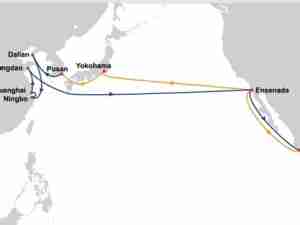China Steel Export Surge This Year Sign of Weak Local Demand
By: Bloomberg News | May 08 2016 at 11:51 PM | International Trade | Maritime
A surge in China’s prices failed to stem steel exports in the first four months of the year, signaling that demand remains weak in the top user. Futures in Shanghai slumped by the exchange limit on Monday.
Shipments climbed to 36.9 million metric tons in the four months to April, up 7.6 percent from a year earlier, according to data from the General Administration of Customs on Sunday. Mills boosted exports even as prices of steel reinforcement bar in Shanghai advanced by more than 50 percent at one point this year to the highest since September 2014.
Steel prices in China had rebounded from five years of losses as the economy stabilized, the property market improved and investors piled into raw-material futures. Shipments of the raw material slid to 9.08 million tons in April from 9.98 million tons in March as the rally revived profit margins at some mills and curbed their need to seek increased income from markets outside the country.
Steel-product exports surged “despite a rebound of domestic steel prices, indicating that Chinese steel demand may be weaker than expected,” analysts including Tracy Liao and Edward Morse at Citigroup Inc. wrote in a note dated May 9.
Rebar Rally
Steel rebar, used to strengthen concrete, slumped on Monday by the exchange limit to 2,175 yuan ($334) a ton. Futures had surged to 2,787 yuan on April 21, the highest intraday level since September 2014, spurring bourses in China to take steps to curb a speculative frenzy in commodities.
Last year, steelmakers in China shipped a record 112 million tons overseas, sending the global market into a tailspin as profits and prices collapsed. This year, the sales may ease to 100 million tons as local demand strengthens, according to an estimate from the China Iron & Steel Association.
Iron ore imports totaled to 83.92 million tons in April compared with 85.77 million a month earlier, according to customs figures. Over the first four months, purchases of ore were 325 million tons, about 6.1 percent more than in the same period of 2015. China is the world’s largest buyer of seaborne iron ore, and its mills account for about half of global steel supply.
ArcelorMittal, the biggest steel-producing company, cautioned last week that while it saw a broad recovery in the global market, Chinese prices may have overshot and could fall back. Risks remained in China because fundamental overcapacity still existed, Chief Financial Officer Aditya Mittal told reporters as the Luxembourg-based company reported a drop in quarterly earnings.
“Steel mills, skeptical of whether the high price is sustainable, continued to be keen to sell overseas,” said Wei Yingsong, an analyst at Mysteel Research.







